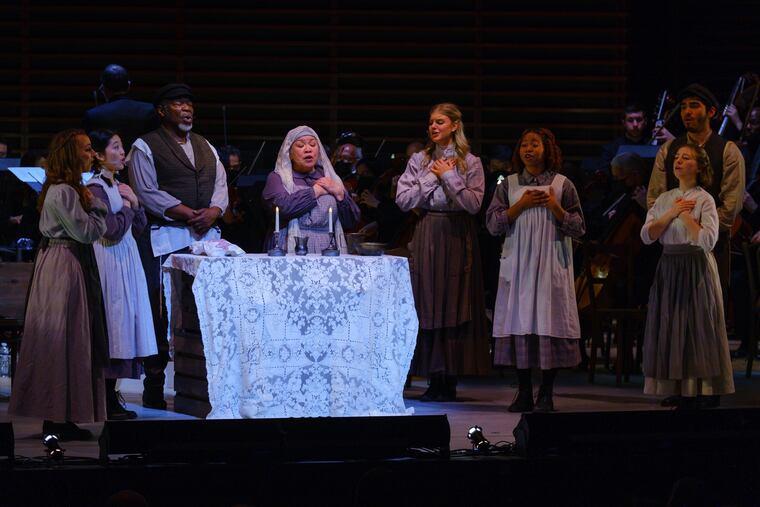Echoes of Ukraine fill Philadelphia Orchestra’s ‘Fiddler on the Roof’
The orchestra said "Fiddler," which takes place during the pogroms that murdered and terrorized Jews in the Russian Empire, is “ever more searing in light of the invasion of Ukraine."

Sometimes in art you struggle for relevance. Other times, the relevance finds you. Putin’s invasion of Ukraine was, of course, unknown and many months in the future when the Philadelphia Orchestra began planning its production of Fiddler on the Roof.
But there the show was on stage at Verizon Hall Saturday night, its characters being forced from their homes somewhere in the Russian Empire. The listener, simultaneously confronting what’s going on now, and a story set more than a century ago, might have felt like the region is doomed to an endless, dehumanizing feedback loop.
The orchestra placed an insert in the program booklet saying Fiddler, which takes place during the pogroms that murdered and terrorized Jews in the Russian Empire, is “ever more searing in light of the invasion of Ukraine.” But the production — stage directed by Sarna Lapine and conducted by Andy Einhorn — aimed for a more universal approach. Yes, with its costumes, props, and choreography (no sets), there was plenty in the take on the 1964 musical that was specifically Jewish — for starters, a story based in a time, place, and historic event specific to the Jewish people. The casting was multiracial, suggesting that people are people, and what ails the world right now is our fixation on differences.
This Fiddler was a collaboration of the orchestra, the University of Michigan and the University Musical Society, with the cast a mix of students and professionals. It had a lot going for it, including providing a welcome chance to revisit the vivid tunes and poignant harmonies that introduced the Jewish sound-world to many a non-Jew. It must be said, though, that there was no single charismatic standout voice in the production. Interestingly, the students on Saturday (the second of three Philadelphia performances) were stronger than the veterans in the cast of singers, actors, and dancers. The focus, if there was one, was the orchestra, and more specifically, this edition of the score.
In its marketing for Fiddler, the orchestra capitalized on the name of John Williams, who is not the composer of the songs — Jerry Bock is. But this particular show is an amalgam: a concert version of the musical originally produced on Broadway, but with the Williams orchestrations and added material used in the 1971 film. And here, a little of the Jewishness drained from the music. Williams has created a very Hollywood sound in this score. This plump, large-scale orchestration sometimes sounds like an outsider looking in.
To be sure, there’s a generous dose of Jewish musical influence in the overture. The solo violin part taken by Isaac Stern in the movie was played by the orchestra’s expert Juliette Kang, who was both fiery and soulful. A bit of klezmer emerged here and there in the solo moments for violin, clarinet, and trumpet, and even accordion.
Even if there are moments that sound strangely like the score to E.T. the Extra-Terrestrial, Williams is a wonderful orchestrator, and the way his sense of sound falls on this orchestra is a thrill — live, especially. At full throttle, the strings are rich, the horns stirring, and the lower brass has bite. Solo voices of English horn player Elizabeth Starr Masoudnia provided tenderness, and trombonist Nitzan Haroz edge.
In some sense, Fiddler has always seemed like one of those shows that goes over the heads of critics and directly to the hearts of listeners. One universally loved aspect of the original 1964 production was Zero Mostel, who played Tevye, the dairyman and father of many daughters.
There are too many singer-actors, dancers, and creatives behind this production to mention — several dozen, including Sholem Aleichem, on whose stories Fiddler is based. Loretta Ables Sayrev as Golde, the wife, was stronger dramatically than vocally. Among the student performers, Ella Olesen as the daughter Tzeitel and Diego Rodriguez as the tailor/suitor Motel were particularly promising.
Chuck Cooper, as Tevye, had a fine voice and no small amount of presence. But what was missing from the established actor’s performance and those of others were the complexities of cultural identity. Only Liz Larsen, as Yente the matchmaker, summoned a slight Yiddish or Eastern European inflection, and while accents and inflections are hard to do without sounding caricature-ish, just a hint vocally rooting these characters to their specific time and place would have been welcome acknowledgment of who they are.
A better-developed sense of humor would have gone a long way, too. Jewish humor is its own thing. It includes self-mocking, wordplay, and irony, and the wry acknowledgment, through impeccably timed vocal moves, that sweetness and tragedy (or at least misfortune) tend to exist on the same plane.
And if, somewhere in the contours of your voice, you can conjure the old country — whether that’s Minsk or Miami Beach — then you’ve really got the audience in the palm of your hands.